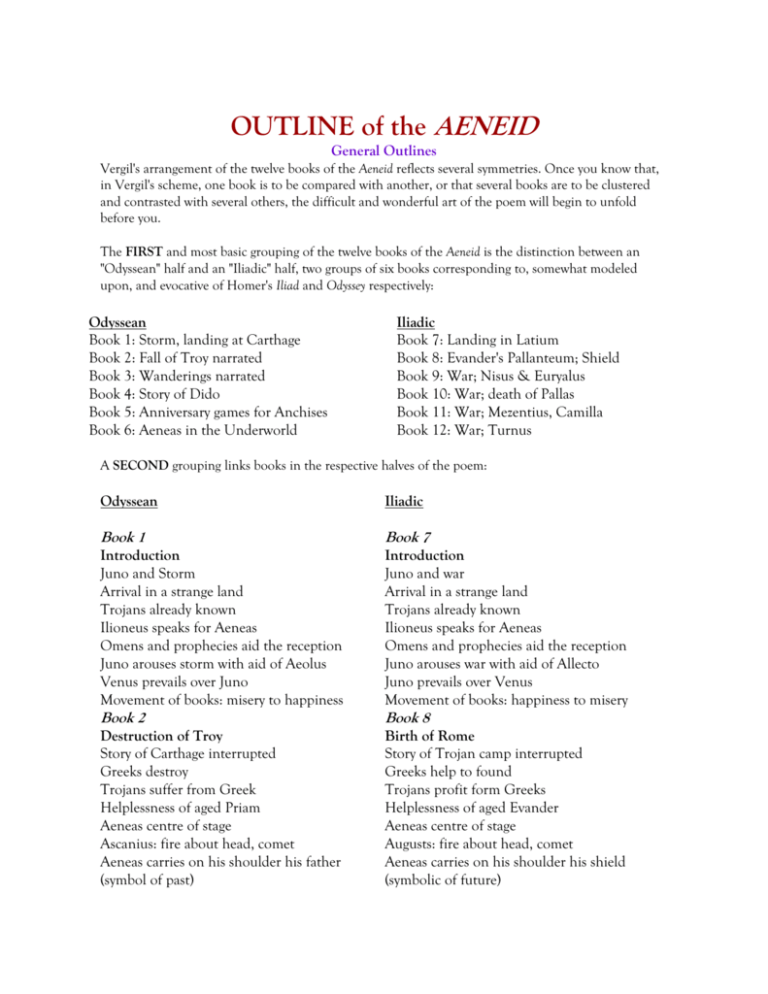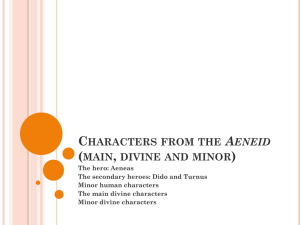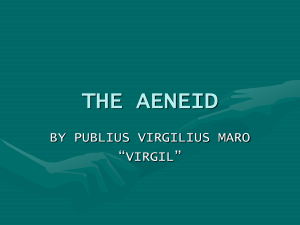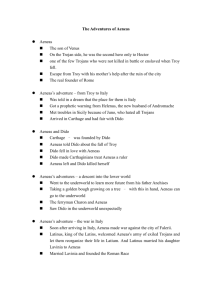Outline of the Aeneid
advertisement

OUTLINE of the AENEID General Outlines Vergil's arrangement of the twelve books of the Aeneid reflects several symmetries. Once you know that, in Vergil's scheme, one book is to be compared with another, or that several books are to be clustered and contrasted with several others, the difficult and wonderful art of the poem will begin to unfold before you. The FIRST and most basic grouping of the twelve books of the Aeneid is the distinction between an "Odyssean" half and an "Iliadic" half, two groups of six books corresponding to, somewhat modeled upon, and evocative of Homer's Iliad and Odyssey respectively: Odyssean Book 1: Storm, landing at Carthage Book 2: Fall of Troy narrated Book 3: Wanderings narrated Book 4: Story of Dido Book 5: Anniversary games for Anchises Book 6: Aeneas in the Underworld Iliadic Book 7: Landing in Latium Book 8: Evander's Pallanteum; Shield Book 9: War; Nisus & Euryalus Book 10: War; death of Pallas Book 11: War; Mezentius, Camilla Book 12: War; Turnus A SECOND grouping links books in the respective halves of the poem: Odyssean Iliadic Book 1 Book 7 Introduction Juno and Storm Arrival in a strange land Trojans already known Ilioneus speaks for Aeneas Omens and prophecies aid the reception Juno arouses storm with aid of Aeolus Venus prevails over Juno Movement of books: misery to happiness Introduction Juno and war Arrival in a strange land Trojans already known Ilioneus speaks for Aeneas Omens and prophecies aid the reception Juno arouses war with aid of Allecto Juno prevails over Venus Movement of books: happiness to misery Book 2 Book 8 Destruction of Troy Story of Carthage interrupted Greeks destroy Trojans suffer from Greek Helplessness of aged Priam Aeneas centre of stage Ascanius: fire about head, comet Aeneas carries on his shoulder his father (symbol of past) Birth of Rome Story of Trojan camp interrupted Greeks help to found Trojans profit form Greeks Helplessness of aged Evander Aeneas centre of stage Augusts: fire about head, comet Aeneas carries on his shoulder his shield (symbolic of future) Book 3 Book 9 Interlude (of wandering) Interlude (at Trojan camp) Aeneas has a minor role Aeneas absent Anchises important Ascanius important Helenus and Adromache (joyful episode) Nisus and Euryalus (tragic episode) Escape from danger: Cyclops, Scylla, Charbydis Escape from danger: Turnus in the Trojan camp Book 4 Tragedy of Love Book 10 Venus and Juno (agreement) Tragedy of War: Pallas; Lausus & Mezentius Inner conflict of Aeneas Venus and Juno (conflict) Affection yields to duty Outer conflict of Aeneas Guilt of Dido: results in death Pity yields to justice Turning point: Aeneas to depart; effect on Guilt of Turnus: leads to death in Book XII Dido Turning point: death of Pallas; effect on Aeneas Suicide of Dido, who cannot live without Aeneas Death Mezentius, who cannot live without Lausus Book 5 Lessening of tension: games Book 11 Funeral games Lessening of tension: truce Aeneas quiets disputes Burial of dead Increase of tension: burning of the ships Latinus unable to avert dissension Death of Parlinurus Increase of tension: renewal of fighting Death of Camilla Book 6 The Future Revealed Book 12 Aeneas receives his commission The Future Assured Dramatic progression: delays and suspense, Aeneas fulfills his commission climaxed by revelation of Rome's destiny Dramatic treatment of combat: delays and Anchises reveals later Roman history suspense, climaxed by victory of Aeneas Death of Marcellus consecrates the New Order Reconciliation of Jupiter and Juno creates later Romans Death of Turnus seals the doom of the Old Order A THIRD grouping finds a series of book-pairs (W.S. Anderson,The Art of the Aeneid): Books 1 & 2: Carthage and Troy Books 3 & 4: The Search for Home Books 5 & 6: Sicily and Italy Books 7 & 8: "War, a monster of two faces" Books 9 & 10: In defeat and victory Books 11 & 12: Turnus or Aeneas? A FOURTH grouping notes three sections of the poem: opening, middle, and closing books: Books 1-4: The "education" of Aeneas Books 5-8: Aeneas takes command Books 9-12: The conduct of the war A FIFTH grouping shows four triads of books: Books 1-3: The "mythic" past Books 4-6: Translation from Troy to Italy Books 7-9: Aeneas absent Books 10-12: Aeneas the Warrior To Roman poets, following the Hellenistic Greeks before them, numbers and symmetry were extremely important in the patterning of their verses. Although a preoccupation with this can become an absurd and esoteric study, Vergil makes clear his patterns. They mean something. Aeneid 1: Beginning of the Epic Background: - epic poetry: Homer & the oral tradition - the Homeric epic hero - the Vergilian epic hero - Rome: 100 years of civil war - Homer & the epic cycle, Greek tragedy, earlier Roman epic - Trojan War: 1184 BC; Roman civil wars 133-31 BC - Homer: first lines of the Iliad & Odyssey • Note Vergil's use of Homeric elements such as epithets, similes, and speeches, but consider how differently he uses them. Concentrate on the first appearances of such devices, and note their significance. (Numbers refer to lines in the Mandelbaum translation.) Epithets of Dido Epithets of Aeneas pious Aeneas ignorant of destiny (422) (307,431,534) unhappy Dido (488) great-hearted (361) Sidonian Dido (632) goddess-born (862) lovely-bodied Dido (700) father Aeneas (977) Queen (735) Trojan Aeneas (837) luckless Dido (933,1043) 1-50: Introduction 51: Juno 75: The Storm 131: First mention & view of Aeneas 177: Neptune 209: First Simile 251: Aeneas' first act 276: Aeneas' first speech 307: Aeneas' first epithet • 312: Jupiter & Venus 422: Dido's first epithet 444: Aeneas & Venus 484: Venus: story of Dido 579: Aeneas' reproach 611: Second simile 625: Temple of Juno 698: First view of Dido 733: Speech of Ilioneus 791: Speech of Dido 825: Aeneas revealed 858: Speech of Dido 915: Cupid & fire 1019: Dido's prayer Ending: "tell us all things/from the first beginning" Aeneid 2: Aeneas Narrates for Dido the Fall of Troy "At this, indeed, I saw all Ilium/sink down into fires" • The actual destruction of Troy is not described in Homer's Iliad or Odyssey, and in fact occurs after the action of the Iliad and before the Odyssey. • Epic cycle; Iliu Persis Honor & glory in Greek epic; Vergil's Roman variation Tradition, from Greek legend, of Aeneas as pius • Note two recurrent motifs: the image of fire, and the relations between fathers and sons. Especially note (at least) three sorts of fire in Book 2: destructive fire, the sacred fire of the hearth, and the "fire" of rage on heart & mind. • Note all the names for Troy: Ilium, Pergamus. Note all the names for Trojans: Dardans, Phrygians, Teucrians. Note all the names for Greeks: Danaans, Dolopians, Myrmidons, Achaeans. • Note important characters: Sinon, Laocoon, Ulysses (the Ithacan), Priam, Hecuba, Hector, Polites, Cassandra, Pyrrus/Neoptolemus, Helen, Anchises, Aeneas, Ascanius/Iulus, Creusa 23: The Wodden Horse: "some trickery is here" 56: Laocoön 81: Sinon's story: breaks off story 141 205: Priam 214: Broken & false oath 233: Ulysses, "inventor of impieties" 257: Story of the Wooden Horse 281: Death of Laocoön, "priest of Neptune" 296: Snakes & fire 341: Cassandra 371: Aeneas dreams of Hector: Hector's speech 408: Aeneas & the battle 413: Simile: Aeneas like a shepherd watching the fires 428: Aeneas the unheeding: "insane, I seize my weapons." 481: Simile: wolves & cubs 510: Simile: Androgeos & the snake; Simile: the hurricane 598: Aeneas at Priam's palace 627: Pyrrus; the snake simile & fire imagery 655: Perverted pietas: "Pyrrus,/His father's force within him" 661: Simile: the Greeks like a river 680-750: The story of Priam 694: Simile: the Trojan women like doves 707: Polites , son of Priam ; Pyrrus, son of Achilles 714: "Polites falls before his parents' eyes" 734: "[Achilles] my father, just as old as Priam" 751: Aeneas' realization: "my dear father, just as old as Priam" 762-790: Aeneas sees Helen: "in my mind a fire was burning" 793: Aeneas & Venus 817: Venus removes the mist which cloaks mortal eyes 825: The gods destroying Troy: Neptune (825), Juno (828), Pallas/Athena/Minerva (830), Jupiter/the father (834) 837: Venus' promise 844: Simile: woodsmen destroy a tree 856: Aeneas at home 891: To Anchises: "could such unholiness fall from a father' lip?" 920: An omen: fire on Ascanians/Iulus 938: An omen: thunder 949-984: Aeneas & Anchises; Anchises accepts the omens 989: Loss of Creusa 1009: Aeneas returns to the city 1040: Creusia's prophesy; "farewell, and love the son we share" 1066: Futile ambrace Ending: "Then I gave way, and, lifting up my father, made for the mountains" Aeneid 3: Troy to Sicily: Wanderings, Prophecies, False Starts • • The third book is framed by Anchises, who is really the Trojan leader at its beginning, and who dies at its end. Aeneas receives several prophecies in this book, and visits several places, even attempting to establish premature settlements. This book ends two books of narration by Aeneas, and the first quarter of the poem, "the 'mythic' past". The book has three main sections: To Buthrotum (1-379) At Buthrotum(380-659) To Sicily (660-926) Characters Polydorus Harpies Celaeno Helenus Andromache Astyniax Polyphemus the Cyclops Sybil at Cumae Enceladus Achaemenides Places Aeneadae in Thrace Island of Delos (Ortygia) Island of Crete Hesperia (Italy) Strophades (Harpies' home) Leucata (Actium) Buthrotum (Little Troy) Cumae Scylla and Charybdis Mt. Aetna in Sicily Drepanum in Sicily 1-18: Introduction, pietas, Anchises leads 23: First settlement: Aeneadae in Thrace 35: Bad omens: blood-dripping roots: Polydorus' story 96: Delos, island of Apollo 125: Prophecy: seek out your ancient mother 134: Anchises interprets: Crete 177: Second settlement: Pergamum in Crete 185: Pestilence 186: Anchises' advice: return to Delos (Ortygia) 196: Prophecy: statues speak to Aeneas in his sleep 240: Anchises interprets: Cassandra had so prophecized 254: Storm and four days drifting 275: Strophades, the island of the Harpies 314: Battle with the Harpies & prophecy: eating of the tables 341: Anchises prays 355: Third settlement: Leucata (Actium) & games (one year) 380: Buthrotum: Helenus and Andromache 417: Andromache's story 453: "As I advance,/I see a little Troy, a Pergamus/that mimes the great one." 484: Helenus' prophecy (restricted by Juno) 526: "conceal your head beneath a purple mantle." 548: Scylla & Charybdis 571: "This more than anything…adore the power of mighty Juno" 576: Consult the Sybil at Cumae 607: Gifts, supplies, weapons 628: Andromache's gifts; Ascanius reminds her of Astyanax 642: 'Your fate is here, then live it happily./But we are called from one fate to another.' 684: Italy sighted; Anchises sacrifices 699: Omen: four white horses grazing 701: Anchises interprets: war, yet hope for peace 712: Sacrifices to Juno 717: Anchises sights Charybdis 741: Landing at Sicily ("the beaches of the Cyclops") 750: The story of Aetna (Enceladus) 764: The story of Achaemenides 801: The story of Polyphemus the Cyclops (compare Odyssey 9) 915: Drepanum; death of Anchises Aeneid 4: The Story of Dido The fourth book is the shortest of the entire poem. With its close, the first "act" (the first third) of the poem is complete. Dido is the first of several victims of Aeneas and his fate. • Note the imagery of fire and hunting. • Characters: Dido (Elissa), Anna (Dido's sister), Sychaeus (Dido's dead husband), Iarbas the Gaetulian, Mercury, Pygamalion (Dido's brother), Barce (Sychaeus' nurse), Iris (goddess of the rainbow) • Note the tripartite structure of Book 4: 1-395: Beginning of the affair 396-695: Quarrel and alienation 696-971: Aeneas' departure & Dido's suicide 1-118: Dido in love 1: Abrupt introduction; Dido: secret flame 9: Anna 16: "Were it not my sure, immovable decision not/ to marry" 27: Dido's oath 38-73: Anna's speech: "How can you struggle now against a love...so acceptable?" 74: Sacrifices 80: especially to Juno, guardian of marriage 90: " Unhappy Dido burns" 92: Simile: Dido like a wounded deer 119-171: Juno & Venus 136: "Let Dido serve a Phrygian husband" 172: The Hunt 190: Simile: Aeneas like Apollo 212: The Storm: "That day was her first day of death & ruin" 229: Rumor 263: Iarbas the Gaetulian 293: Jove sends Mercury 346: [who] "sees Aeneas founding fortresses/and fashioning new houses" 353: Speech of Mercury 373: Aeneas decides to leave 396-545: The Quarrel 403: Simile: Dido like a Bacchante 410: Speech of Dido to Aeneas 446: Speech of Aeneas: " I am not furtive, I have never held/the wedding torches as a husband." • 492: " It is not/my own free will that leads to Italy." 497: Second speech of Dido and curse 536: Aeneas' grief 551: Simile: The Trojans like ants 571: Speech of Dido to Anna 595: "I only ask/ for empty time, a rest and truce for all this frenzy." 610: Simile: Aeneas like an immovable oak tree 641: Wandering Dido; Simile: Dido like Pentheus or Orestes 654: Dido's secret plan; The Pyre 723: Dido's sleepless night 768: Mercury visits Aeneas in his sleep 837: Dido's curse 868: "Let them and their sons' sons learn what is war." 888-971: Dido's death Aeneid 5: Anniversary Games for Anchises in Sicily Book 5 is dominated by anniversary games for Anchises, comprising a regatta, foot race, archery, boxing, and a parade. This episode is reminiscent of the funeral games for Patroclus in Iliad 23, presided over by Achilles, and the games in Odyssey 8, in which Odysseus competes. • A quieter book, placed between the two intense narratives of Books 4 and 6, it is critical in showing the development of Aeneas' character and his status as a leader. Completely demoralized at the outset, as the Trojans leave Carthage, his qualities are demonstrated as he directs the games. Yet, the near-disaster of the burning of the ships severely tests him. This is the last book that takes place outside of the Italian peninsula. • Note the attention lavished on individual Trojans, many of whom carry family names, prominent in Rome. Some, especially Nisus and Euryalus in Book 9, will figure prominently later in the poem. Note especially Palinurus, who opens Book 5 in virtual command of the fleet, and closes it with his dedication to Aeneas and his death, while Aeneas, grieving, symbolically takes over control of the ship & fleet. Palinurus, like Dido, is a victim of the gods, and dies mysteriously, sacrificed to Aeneas' fate. • The Games and Participants: - Regatta: Gyas & Menoetes (" The Chimera"), Mnestheus (" The Shark") Cloanthus ("The Scylla"), Sergestus ("The Centaur") - Footrace: Nisus & Euryalus and others - Boxing: Dares, Entellus - Archery: Hipocoon, Mnestheus, Eurytion, Acestes - Troy Parade: Priam, Euryotion, Iulus 10: A third storm drives them toward Drepanum in Sicily 15: Aeneas & Palinurus 99: Rites at Anchises' tomb 122: Simile: the snake like a rainbow 156-377: Regatta 193: Simile: the ships like chariots racing • 280: Simile: Mnestheus' ship like a dove 360: Simile: Sergestus' ship like a snake run-over 378-477: Footrace 429: Nisus slips in sacrificial blood 478-641: Boxing 488: Dares 512: Acestes urges on Enthellus 613: Aeneas stops the match: " Poor man, what madness has possessed your mind?" 625: Entellus' prize & offering 642-715: Archery 682: Acestes' flaming arrow 716-794: The Troy Parade 795-922: Juno, Iris; the Trojan Women burn the ships 879: Ascanius 903: Aeneas' dismay 950: Anchises' image appears: "obey the excellent advice old Nautes gives" 961: Anchises' prophecy 1023: The Trojans set sail 1026: Venus & Neptune 1077: "One life shall be enough instead of many" 1103: Palinurus and the god Sleep 1150: Aeneas' ironic closing words: "O Palinurus, too trustful of the tranquil sky & sea, you will lie naked on an unknown shore." Aeneid 6: Italy & the Underworld Vergil's Book 6 has its counterpart in Homer's Odyssey trip to the Underworld, here he encounters a young comrade-in-arms recently dead, tries in vain to embrace his mother's shade, and sees a procession of mythological personages as well as his Greek companions killed at Troy during their homecomings. • The description of Vergil's Underworld, not always consistent in its parts and its conception, includes two passages extremely important for the Aeneid as a whole: Anchises' explanation of reincarnation and the soul's progress, and the long pageant of Roman history still to come. • This book shares with Aeneid 2 great descriptive power, but is full of mystery. Note both the entrance (The Golden Bough) and exit (Twin Gates of Sleep) to the Underworld are magical and enigmatic. • Although it contains final glimpses of Aeneas' Trojan past and his last attempt to communicate with Dido, Book 6, in preparation for the coming wars that lead up to the founding of Rome, emphasizes the future. This is the first part of the poem to take place on the Italian mainland, and Vergil invests it with a completely Roman feeling, in its identification of well-known places named after characters (Misenus, Palinurus), as well as its invocation of both distant and recent Roman history. 1: Landing at Cumae in Italy (Hesperia) 19: Temples of Apollo: scenes created by Daedalus • 50: The Sibyl ( Deiphobe): "This is no time to gape at spectacles"; sacrifice 60: The Cave: "The god is here! The god." 77: Aeneas prays 109: The Sibyl possessed: "I see wars, horrid wars..." 143: Aeneas' prayer & request: "Take pity on one who is both a father and a son." 173: The Sibyl: "That is the labor, that is the task" 190: Description of the Golden Bough 207: "The lifeless body of your friend now lies..." 216: The story of Misenus: "He challenges the gods..." 275: The Golden Bough 285: Funeral rites for Misenus 316: The cave; sacrifice 346: "You need your courage now, you need your heart." 380: Vergil's invocation to the Underworld gods 386: Entrance to the Underworld 394: Charon the ferryman; recent dead buried & unburied 430: "Before his bones have found their rest, no one/may cross the horrid shores and the hoarse waters./They wander for a hundred years and hover about these/banks until they gain their entry,/to visit once again the pools they long for." 442-505: Palinurus 506: Charon's challenge 525: The Sibyl's answer: presentation of the Golden Bough 550: Cerberus barking 562: Three groups of untimely dead 593: Phoenician Dido, "dim shape among the Shadows" 600: Trojan Aeneas speaks: "Whom do you flee?/This is the last time that fate will let us speak." 630: Those renowned in war 651: The story of Deiphobus 709: The Sibyl: "The night is near, Aeneas, and we waste our time with tears." Past the book's midpoint 725-832: Region of punishments 847: Groves of Blessedness 859: Trojan mythological past 869: Patriots, priests, poets 898: Anchises, "studying the sons of all his sons to come." 922: "O father, let me hold your right hand fast,/do not withdraw from my embrace." cf. Creusa, 2.1068 931: Simile: unborn souls like bees in the meadows 948: "Why this wild longing for the light of earth?" 956: Anchises: Reincarnation & the Soul's Progress 965: "They are all dulled by harmful bodies" 980: "First each of us much suffer his own Shade" 999: Anchises unfolds future Roman history (cf. Jupiter 1.354ff; Shield of Aeneas 8.810ff) 1008: Silvius & descendants 1026: Romulus 1044: Caesar Augustus 1061: Comparison with Hercules, a bringer of peace 1072: Numa Pompilius, Etruscan kings, pre-Republican Rome 1083: Brutus, avenger & first consul (507 BC), "unhappy man" 1092-1128: The Roman Republic 1129: "For other peoples will, I do not doubt,/still cast their bronze to breathe with softer features,/or draw out of the marble living lines,/plead causes better, trace the ways of heaven/with wands and tell the rising constellations;/but yours will be the rulership of nations,/remember, Roman, these will be your arts:/to teach the ways of peace to those you conquer,/to spare defeated peoples, tame the proud." 1140: The elder Marcellus, M. Claudius Marcellus, consul 222 BC 1148: The younger Marcellus (42 BC-23 BC) Augustus' nephew 1191: The Gates of Sleep Aeneid 7: Arrival at the Tiber and War Book 7 is a fast-paced narration of events after the Trojans reach Italy, where one prophecy is fulfilled - the eating of the tables - and another revealed by Latinus, concerning Aeneas. • It has a new invocation, where the poet insists that the greater part of his poem, "a greater labor," is still to come. This, the first book of the Aeneid based upon Homer's Iliad, recalls the battles of the Homeric poem. It also begins the third quarter of the poem, wherein Aeneas is largely absent from the action. • The seventh book is also an important introduction to the major characters of Books 712; a standard feature of epic poetry, a catalogue of warriors, comprises the last quarter of the book. • Characters: Latinus, Allecto, Amata, Turnus, Lavinia, Almo, Galaesus 1: Arrival 5: Invocation 55: King Latinus 90: Lavinia ablaze (like Iulus in Book 3) 135: Omen: the Trojans eat their tables 190: Departure of 100 emissaries to Latinus 223: Latinus' palace 257: Latinus' speech; compare Dido's welcome in Book 1 280: Ilioneus' speech 332: Latinus & the oracle 377: Juno & Allecto 414: Juno: "I cannot keep him from the Latin kingdoms" 427: Allecto 501: Amata; simile: Amata like a top 540: Allecto arouses Turnus 603: Simile: Turnus like a boiling cauldron 628: Peasants; the sacred stag • 636: "This hunting was the first cause of the troubles" 684: War breaks out 699: First killed: "the eldest son of Tyrrhus, the young Almo" 705: and "Old Galaesus", a peacemaker 772: Simile: Latinus like a rock 792: Latinus "let the reins of rule fall slack" 793: Juno opens the twin Gates of War 847: Second invocation 854: Catalogue of the Italians; Mezentius & Lausus 1029: Turnus 1055: Camilla Aeneid 8: The Future Site of Rome The eighth book suspends the narrative of gathering war and shows the human & divine forces gathering on both sides. Aeneas is at the forefront here, as Turnus had been in Book 7; he gains allies and learns much about the future of his people. The book has two major episodes: the visit to Evander's settlement, and the description of the Shield of Aeneas. • Evander's city is a celebration of the primitive origins of Rome that the sophisticated Augustan Romans claimed to revere; we shall later see Ovid mock this primitivism. Evander & Hercules are models for Aeneas' emulation; he gains an adoptive father and an adoptive son in Evander & Pallas. • The Shield of Aeneas, reminiscent of Achilles' divine shield in Iliad 18, does not have the microcosmic wonder of the Greek work, which depicted a city of peace and a city at war. Instead, Vulcan has arranged myth and Roman history into a wonderful design, which Aeneas literally and figuratively lifts onto his shoulders as his personal burden and glory. • Characters: Evander, Venus, Pallas, Vulcan, Hercules, Tiberinus, Cacus, Mezentius 1: Italy rises in arms 33: Tiberinus, (the god of the river Tiber) appears to Aeneas 107: Omen: the white sow 131: Evander's settlement, Pallanteum 143: Pallas 164: Aeneas addresses Evander 198: Evander's welcome and feast 242: The story of Hercules & Cacus 411: Evander's hut: "My guest, dare to despise riches and try,/as he did, to deserve divinity." 485: Venus and Vulcan 507: Vulcan at his forge 610: Evander's story; Mezentius 702: Sacrifice; departure of Aeneas & Pallas 787: Shield of Aeneas • Aeneid 9: The Trojans Besieged; the Story of Nisus & Euryalus The action & structure of Book 9 follow two days and an intervening night. Aeneas' absence is acutely felt, and is responsible for the two sustained episodes of personal glory: the tragic story of Nisus & Euryalus, and the exploits of Turnus. The Trojans find eerie and haunting parallels with their past: besieged once again within their ramparts, as they had been at Troy, they find a "second Achilles" in Turnus - as Turnus himself boastfully proclaims. The first sustained fighting sets in, which will intensify into the fierce war of Books 10-12. First Day: Trojans Besieged 1: Juno sends Iris to Turnus 31: The Italians advance 75: Simile: Turnus like a wolf 87: Turnus prepares fire for the Trojan ships 102: Cybele (Mt. Berecynthus) & her ships: story & prophecy 141: Ships turned into nymphs: "go free, my ships" 160: Turnus' speech Night: Nisus & Euryalus 232: Nisus, son of Hyrtacus; Euryalus, son of Opheltes 243: "Euryalus, is it the gods who put this fire in our minds,/or is it that each man's relentless longing becomes a god to him?" 300: Council of war: Aletes, Ascanius 374: Euryalus' mother 451: Simile: Nisus like a starving lion 486: Euryalus takes Messapus' helmet: "It fits well" 494: Volcens & his troops discover them 520-590: Death of Nisus & Euryalus 572: "He only loved too well his luckless friend" 578: Simile: Euryalus like a purple flower in death 591: The poet's address: "Fortunate pair…" Second Day: The Italians Attack 618: The heads of Nisus & Euryalus 628: Euryalus' mother 668: The Italians attack; fighting 696: The poet invokes the Muse; Turnus' glory 703: The tower collapses 798: Italian "manliness" vs. Phrygian "effeminacy" 830: Ascanius kills Remulus Numanus 852: Apollo to Ascanius: "O son of gods & ancestor of gods" 898: Pandarus & Bitias open the gates 990: Turnus inside the Trojan camp: "Here too an Achilles can be found" 1007: Turnus' mistake 1056: Simile: Turnus attacked like a lion 1070: Jupiter, Iris, Juno 1083: Turnus leaps into the Tiber river • Aeneid 10: Pallas, Lausus & Mezentius • • The tenth book comprises three sections: the first, a prologue to Aeneas' joining the battle, begins with a council of gods and ends with Aeneas and his allies landing in Latium. The second section concentrates on Pallas' death and Aeneas' frenzied (and sometimes impious) reaction. The third includes the delusion of Turnus and the deaths of Lausus & Mezentius. The poetry is extremely moving - and disturbing. The Tragic death of Pallas drives Aeneas to cruelty and impiety; Lausus' own conspicuous pietas touches him deeply and sobers him. Note how different are Turnus' killing of Pallas and Aeneas' killing of Lausus. Note your changing opinion of the impious Mezentius. Prologue 1-168: Council of the gods 169: Siege of the Trojan camp 206: Aeneas on the way 230: Catalogue of Etruscan ships 305: The nymphs address Aeneas 361: Arrival of Aeneas & allies 424: Battle at the beach Battle (first phase): Death of Pallas 501: Pallas rallies the Arcadians 562: Simile: Pallas' men fight like fire set by a shepherd 593: Lausus and Pallas 607: "The king of high Olympus did not let the duel" 609: Pallas and Turnus 615: "I could have wished his father here to watch" 644: Hercules grieves for Pallas 678: Turnus: "Just as he deserved, I send him Pallas" 682: The belt of Pallas 690: Vergil on Turnus 703: Aeneas goes crazy 833: Jupiter and Juno 872: Juno deludes Turnus Battle (second phase): Deaths of Lausus & Mezentius 943: Mezentius fighting 1056: Mezentius impious 1087: Vergil's praise of Lausus 1092: Aeneas kills Lausus 1114: "Your loyalty (pietas) has tricked you into recklessness." 1142: Mezentius by the river 1198: Aeneas kills Mezentius Aeneid 11: The Story of Camilla Book 11 falls into two halves. The first half consists of the burial of Pallas, a 12-day truce, and a war council of Italians; the second is devoted to a long cavalry battle featuring the warrior-maiden Camilla. First Half 1: Trophy of Mezentius 37: Funeral procession of Pallas 85: Simile: Pallas like a flower 130: Embassy of the Italians 181: Arrival of Pallas' body 240: Funerary rites on both sides: "a great heap of tangled butchery without a number, without honor." 278: Public outcry: Turnus should fight Aeneas in a duel. 295: Italian council of war 317: Speeches: of Venulus, 400: of Latinus, 443: Drances, 498: and Turnus 592: War breaks out Second Half 643: Arming of Turnus 650: Simile: Turnus like a stallion 658: Turnus and Camilla plan 698: The goddess Diana tells the story of Camilla 789: Cavalry battle 854: Camilla's exploits 1040: Arruns prays… 1055: …and strikes down Camilla 1101: "with a moan, her life, resentful, fled to Shades below" 1134: The nymph Opis kills Arruns 1187: Turnus abandons his ambush • Aeneid 12: The Death of Turnus The longest book in the poem begins and ends with Turnus. It revolves around a duel between him and Aeneas that is postponed repeatedly. But once Juno submits to Jupiter (and Fate), the outcome is decided. Vergil depicts Turnus' death sympathetically, and the motivations and actions of Aeneas are enormously complex. 14: Turnus agrees to a duel 23: Latinus opposes 75: Amata opposes 88: Lavinia's "burning face"; simile 110: Preparations for a duel 181: Juno and Juturna, the sister of Turnus 216: Ceremonies and speeches: Aeneas… • 265: …and Latinus 295: Picture of Turnus 303: Juturna provokes the Italians 330: Omen: eagle attacked 348: Treaty broken 423: Aeneas wounded 437: Turnus' exploits 520: Iapyx the surgeon 556: Venus heals Aeneas' wound 582: Aeneas addresses Ascanius 623: Aeneas seeks Turnus alone 665: "Aeneas' anger seethes" 763: "I shall annihilate that city" 782: "Twice the Latins…have broken treaties" 789: Simile: shepherd smokes out bees 796: Suicide of Amata 839: Turnus addresses Juturna 906: Turnus: "let me rage this madness out before I die" 929: Duel 990: Simile: Aeneas and Turnus like hunting dog and stag 1049: Jupiter and Juno 1066: "This is the end…you cannot pass beyond this point." 1072: Juno yields 1100: "Troy now is fallan; let her name fall too." 1101: Jupiter to Juno: prophecy 1149: Jupiter sends a Fury to Turnus 1175: Juturna departs 1178-1271: Aeneas and Turnus 1142: Turnus entreats Aeneas 1252: "Aeneas stood, ferocious in his armor…and he hesitated" Consider: why does Aeneas hesitate to kill Turnus? Why, then, does he finally kill him? What is Aeneas' mental and emotional state at this point of the poem? What does pietas have to do with this ending? Compare the deaths of Pallas, Turnus, and Mezentius in Book 10. The Similes of the Aeneid Book 1 Neptune like a speaker quieting a crowd Carthaginians like bees working Dido like the goddess Diana Aeneas' beauty like artful ivory, marble, or silver in gold Book 2 Laocoon like a bull at the altar Aeneas like a shepherd watching flames, bewildered and unknowing Trojans like hungry wolves Androges like a man who has stepped on a snake Shifting cyclone Flood over fields Pyrrhus like a snake Greeks like a foaming river Trojan women like doves Ilium falls like an ash tree in the mountains Book 3 Cyclopes like tall trees Book 4 Dido like a deer Aeneas like Apollo Mercury like a fishing bird Trojans like ants on the shore Aeneas like a storm-tossed oak Book 5 Mnestheus' ship like a dove Sergestes' ship like a snake run over by a cart Entelles like a storm Acestes' arrow like a comet Troy Parade like the labyrinth in Crete Book 6 Golden bough like tough mistletoe Shades of the dead like trees or birds Souls awaiting birth like bees Book 7 Amata like a spinning top Turnus like a bubbling cauldron Battle like the sea Latins like a rock in the water Men marching and singing are like swans Men marching are like waves of grain Book 8 Troubled Aeneas like light on the water Vulcan's love for Venus like lightning Pallas like Lucifer Aeneas' armor like a bright cloud Book 9 Soldiers like a river Turnus like a wolf at a sheepfold Nisus like a lion Euryalus like a flower in death Surrounded soldier like a trapped animal Turnus like an eagle snatching rabbit or swan Ground is thick with weapons like a storm Pandarus and Bitias like oaks by a river Soldiers falls like pilings thrown in the sea at Baiae Turnus in the city like lion in a sheepfold Turnus like a lion surrounded Book 10 Murmur among the gods like wind in the woods Ascanius like a gem Aeneadae like cranes Aeneas like a comet Stalemated battle like contending winds Pallas enflames others like fires set by a shepherd Turnus approaches Pallas like a lion approaching a bull Aeneas like hundred-handed Aegaeon Mezentius like a rock Mezentius like a boar Mezentius like a lion before a sheepfold Mezentius like Orion Aeneas like a plowman; a farmer; a traveller waiting for rain to stop Book 11 The dead Pallas like a flower Latinus' council murmurs like a rock midstream Clamor in Rutulian camp like birds in the trees Turnus like a horse freed Italians like the sea ebbing Camilla and her attendants like Thracian Amazons Camilla like a hawk with a dove Tarchon and Venulus like eagle and snake airborne, fighting Arruns like a wolf after killing Book 12 Turnus roars like a wounded Carthaginian lion Lavinia blushes like ivory stained red Turnus like a bull practicing for battle Turnus like the god Mars raging in Thrace Battle-lines give way to Turnus like waves to the North Wind Aeneas leads his men like advancing cloud Juturna like a swallow Turnus and Aeneas like twin fires or streams Latins like bees trapped inside rock, raging Turnus breaks through ranks like an avalanche or flood Aeneas like Athos, Eryx or Apenninus Aeneas and Turnus like two bulls coming together Turnus like a deer hemmed in Fury, sent by Jupiter, like a Parthian arrow Turnus like a man who dreams of himself running and trying to talk *Notice that similes occur most often when warfare is the subject: in the first half of the poem, there occur more similes in Book 2 than in any other; the second half of the poem, where the fighting is fiercest, contains more than twice as many similes as the first half, and the greatest number is found in Book 12. Remember, the Iliad, which contains many more scenes of fighting, has far more similes than the Odyssey. Acknowledgement: To Randall Colaizzi




